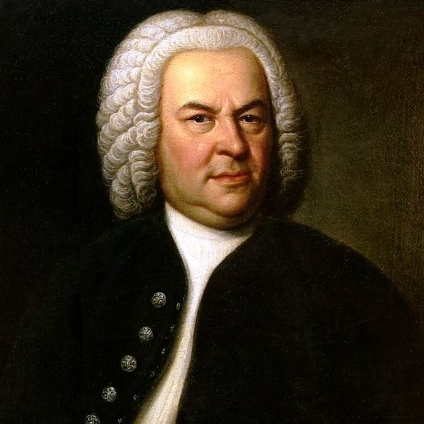
Saturday, September 24, 2022 at 7:30 pm
Sunday, September 25, 2022 at 2:00 pm
St. Andrew's United Church, Halifax
Featuring Ivars Taurins, conductor and narrator
Hélène Brunet, soprano
Charlotte Forknall, mezzo-soprano*
James Whitley, tenor*
Böðvar Ingi Geirfinnsson, baritone*
Danielle Johannes, oboe
Marie Bouchard, harpsichord and organ
Symphony Nova Scotia
*Appearing with thanks to the Fountain School of Performing Arts.
| Johann Sebastian Bach (1685-1750) |
Prelude in C Major from The Well-Tempered Clavier, Book I, BWV 846 Marie Bouchard, harpsichord Air from Orchestral Suite No. 3, BWV 1068 Aria “Bist du bei mir”, BWV 508 Hélène Brunet, soprano |
| Johann Kuhnau (1660-1722) |
Aria “Komm doch süße Stunde” from Cantata Weicht ihr Sorgen aus dem Hertzen Hélène Brunet, soprano |
| Johann Friedrich Fasch (1688-1758) |
Sonata à 4 in D Minor: Largo & Allegro |
| J.S. Bach | Final chorale “Christe, du Lamm Gottes” from Cantata BWV 23 Hélène Brunet, soprano Charlotte Forknall, mezzo-soprano James Whitley, tenor Böðvar Ingi Geirfinnsson, baritone Prelude in C Minor, BWV 546 (excerpt) Marie Bouchard, organ |
| Johann David Heinichen (1683-1729) |
Concerto Grosso in G Major, S. 217: Allegro |
| Francesco Maria Veracini (1690-1768) |
Overture No. 6 in G Minor: Allegro |
INTERMISSION
| Jean-Philippe Rameau (1683-1764) |
Overture & “Chantons sur la musette” from Hippolyte et Aricie: Hélène Brunet, soprano |
| George Frideric Handel (1685-1759) |
Concerto and Aria “Affanni del pensier” from Ottone Aria “Amor commanda” from Floridante Hélène Brunet, soprano |
| Tomaso Albinoni (1671-1751) |
Concerto à 5 in G Major, Op. 9, No. 2: Adagio Danielle Johannes, oboe |
| Georg Philipp Telemann (1681-1767) |
Overture in B-flat Major, from Musique de Table, 3ème production: Postillons – Badinage – Conclusion |
| J.S. Bach | Aria “Bist du bei mir” BWV 508 Hélène Brunet, soprano |
Bach: “Bist du bei mir”:
| Bist du bei mir, geh ich mit Freuden | When thou art near, I go with joy |
| zum Sterben und zu meiner Ruh. | To death and to my rest. |
| Ach, wie vergnügt wär so mein Ende, | O how pleasant would my end be, |
| es drückten deine schönen Hände | If your fair hands |
| mir die getreuen Augen zu! | Would close my faithful eyes! |
Kuhnau: “Komm doch, süße Stunde” from Weicht ihr Sorgen aus dem Hertzen
| Komm doch, süße Stunde, | Come, do, sweet hour |
| da mein geist | at which my spirit |
| sich der Eitlekeit entreißt. | is to be delivered from vanity. |
| Ach im Herrn |
Ah, today would I gladly and sincerely |
| stürb’ ich heute herzlich gern, |
die in the Lord, |
| denn sein Heil |
for his salvation |
| und er selber ist mein Teil. |
and he himself are my portion. |
| Mich verlangt von Hertzen Grunde. |
I desire it from the bottom of my heart. |
| Komm doch, süße Stunde. | Come, do, sweet hour. |
Bach: Chorale from Cantata BWV 23
| Christe, du Lamm Gottes, | Christ, Lamb of God, |
| Der du trägst die Sünd der Welt, |
you who bear the sin of the world, |
| Erbarm dich unser! |
have mercy on us! |
| Christe, du Lamm Gottes, |
Christ, Lamb of God, |
| Der du trägst die Sünd der Welt, |
you who bear the sin of the world, |
| Erbarm dich unser! |
have mercy on us! |
| Christe, du Lamm Gottes, |
Christ, Lamb of God, |
| Der du trägst die Sünd der Welt, |
you who bear the sin of the world, |
| Gib uns dein' Frieden. Amen. | grant us Your peace. Amen. |
Rameau: “Chantons sur la musette” from Hippolyte & Aricie
| Chantons sur la musette, chantons. | Let us sing to the musette, let us sing. |
| Au son quelle répette, dansons. |
To the sound that repeats, let us dance. |
| Que l’Écho fidelle rende nos chansons. |
May faithful Echo return our songs. |
| Bergère trop cruele, goûtez ses tendres leçons. |
Shepherdess too cruel, enjoy her tender lessons. |
| Chantons sur la musette, chantons. |
Let us sing to the musette, let us sing. |
| Au son quelle répette, dansons. | To the sound that repeats, let us dance. |
Handel: “Affanni del pensier” from Ottone
| Teofane: | |
| Affanni del pensier, | Torments of my thoughts, |
| Un sol momento datemi pace almen, |
For a single moment give me some peace, |
| E poi tornate! |
And then you can return! |
| Ah! Che nel mesto sen |
Ah! Yet in my grieving heart |
| Io già vi sento |
I still feel you |
| Che ostinatila pace a me turbate. | Obstinately disturbing my peace. |
Handel: “Amor commanda” from Floridante
| Timante: | |
| Amor commanda, Onore invita | Love commands, Honour invites; |
| Più bell’ impegno |
A more worthy undertaking |
| D’espor la Vita no, non si da. |
To venture life one cannot have. |
| Già l’Alma acces di bella Gloria |
The soul now kindled with noble glory, |
| Corre all’Impresa |
Flies to the enterprise, |
| E di Vittoria Sicura è già. |
And is already secure of victory. |
| Amor, &c. | Love, &c. |
Bach: “Bist du bei mir”:
| Bist du bei mir, geh ich mit Freuden | When thou art near, I go with joy |
| zum Sterben und zu meiner Ruh. | To death and to my rest. |
| Ach, wie vergnügt wär so mein Ende, | O how pleasant would my end be, |
| es drückten deine schönen Hände | If your fair hands |
| mir die getreuen Augen zu! | Would close my faithful eyes! |
